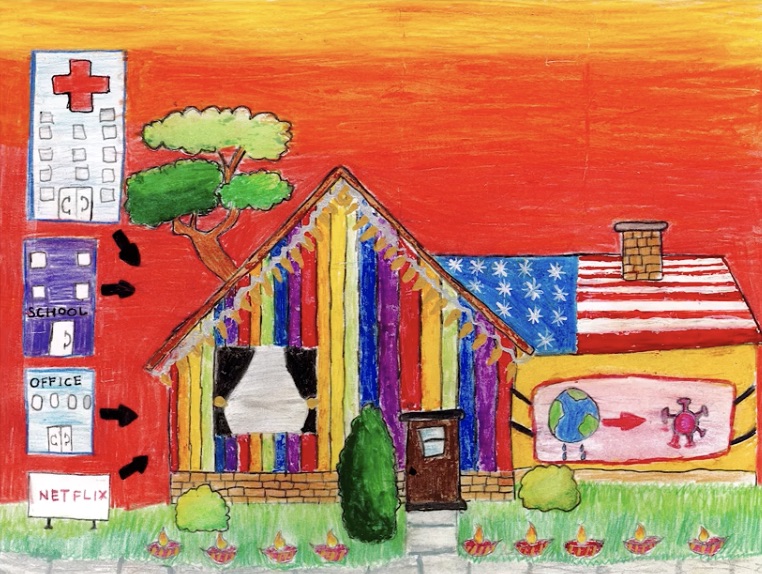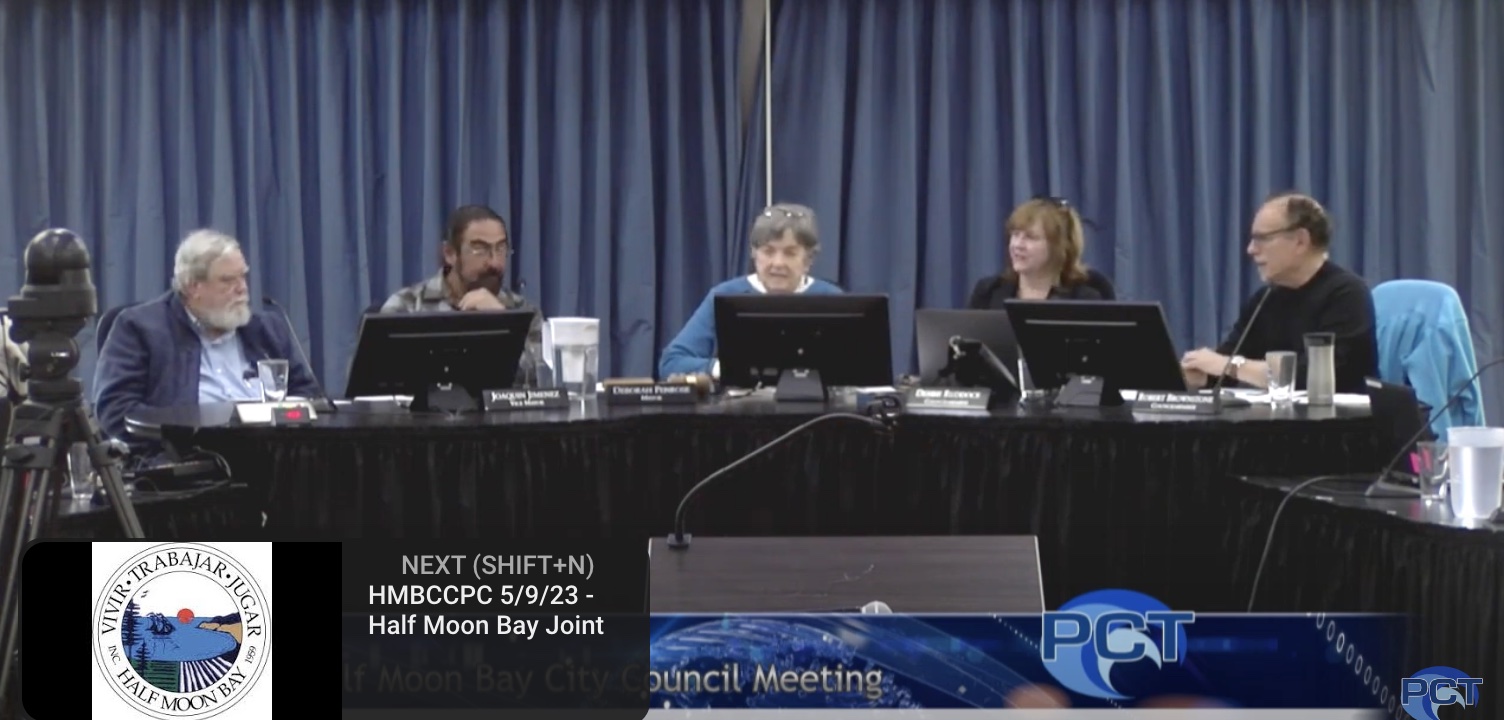|
Getting your Trinity Audio player ready...
|
VIDEO. From the City of Half Moon Bay City Council meeting on Tuesday, September 7th, 2021 at 7:00pm by Zoom.
City of Half Moon Bay has 4,115 single family homes. Surely, during the housing crisis, a possible solution would be to clean out a room and share with someone?
What about:
- a local teacher?
- firefighter?
- police officer?
- your favorite restaurant worker?
- construction worker?
- local public agency worker?
www.hiphousing.org
Are You a Hipster? Have a Spare Room? Earn Some Money? Have Company and Help?
FREQUENTLY ASKED QUESTIONS ABOUT THE HOME SHARING PROGRAM
1. How does home sharing work?
HIP Housing is a nonprofit organization which since 1972 has been connecting Home owners or renters (Home Providers) who have a residence with one or more bedrooms, with persons seeking housing (Home Seekers) to pay rent or exchange activities for reduced rent. HIP Housing’s Home Sharing program is not a short-term vacation rental type program. Home Providers must live in San Mateo County. Persons seeking housing must either live, work or attend school in San Mateo County or have a housing voucher for San Mateo County.
In this housing market, rents in the Home Sharing Program typically range from $750 on up with occasional lower rents. Some rents include utilities and others pay a portion. Reduced Rent Exchanges involve non-medical care such as helping with meals, shopping, cleaning, companionship and doing errands.
There are generally more rent exchanges than reduced rent exchanges. Each person has their own space and share common areas. Sometimes clients share a one bedroom unit with one person taking the living room space and the other taking the bedroom. After clients are interviewed by a HIP Housing coordinator, clients are given referrals and contact potential housemates on their own using a guide provided by the agency. HIP Housing’s Home Sharing Coordinators help complete Living Together Agreements between housemates and provide follow-up support.
www.hiphousing.org
2. What are the benefits of Home Sharing?
Whether a home provider or home seeker, one of the reasons persons decide to home share is because they find it difficult to afford housing costs on their own. For those hoping to find an affordable or low-income housing unit, they may encounter long or closed waiting lists. The reality of getting low-income housing within a short period of time isn’t likely. That’s why home sharing can be a unique housing option. Some clients home share until they are able to find subsidized or low-income housing while others choose home sharing as a way to keep their housing costs affordable on a long-term basis. For home providers, with someone else living in the home they are able to continue living in their own home and neighborhood. Additional benefits of home sharing allow home providers to save money, put the extra income toward other personal or housing expenses, experience a sense of security, enjoy companionship and maintain independence. With market rents unattainable for many, home sharing gives home seekers an affordable room in a home atmosphere. Many home sharers receive mutual benefits of companionship and security, the opportunity to help the home provider and being able to save money, reduce debt and keep housing & utility costs affordable.
3. What type of client applies to the home sharing program?
HIP Housing interviews clients of all walks of life including those who are working, seniors, single parents, persons with disabilities, persons exiting from a shelter, students and others who receive benefits such as unemployment, TANF, retirement or disability income.
4. What information do we need from the person applying for home sharing?
Applicants are asked to provide proof of ID, names and phone numbers of three persons they would like to use as a reference (preferably employment, residence and personal) and proof of their income. Income information is confidential and used only for statistical purposes. If you are seeking housing, you will be required to provide a current or former landlord or housemate as a reference. Provided the information is available, HIP Housing will conduct a criminal background search through Superior Court databases and a National Sex Offender database check. Information obtained may disqualify someone from the program or may require disclosure on the application and to potential housemates.
5. How long does it take to place someone in home sharing?
Clients are encouraged to keep in regular contact with their home sharing coordinator to receive referrals of potential housemates and then to follow-up with the referrals given by returning calls and making appointments to see potential housemates. The number of referrals given to clients of potential housemates depends on a number of factors: family size seeking housing, amount of rent charged/able to pay, location, pets, smoking and other personal preferences. HIP Housing’s staff will work with clients for the duration of the time they are searching for a housemate whether the client finds a placement through our agency or something on their own. HIP Housing cannot guarantee a housemate placement.
6. How long does the typical match last?
If both parties are happy with the match & circumstances do not change for either side, matches can last for many years, with great friendships being formed. The average length of stay is nearly three years with some matches lasting a shorter or longer period of time.
7. Do you match people of different ages, interests and genders?
Yes. Clients are asked to complete a questionnaire giving them the opportunity to share with us their ideal home share arrangement, personal characteristics and other factors regarding living with another person. Clients have the opportunity to interview and select their own housemate and to check the references of clients.
8. How do you complete a match?
The two parties in a home sharing match are offered the opportunity to put their understandings in writing by completing a Living Together Agreement with the assistance of the housing counselor. Each participant is encouraged to review the agreement periodically to make any adjustments or changes. HIP Housing is available to help housemates work through any issues or concerns once the housing arrangement begins. If the match needs to end, each participant is expected to give the other party a written notice as agreed upon in the Living Together Agreement.
9. What can you do to help encourage persons to home share?
People may not consider home sharing an option because they believe they can find their own place, find a housemate on their own or may have had a negative experience home sharing on their own. For those seeking housing, finding independent housing may be a longer term goal and clients should take into consideration their ability to pay a first and last month’s rent and deposit, credit and debt situation and paying a rent that may be beyond their means. For Home Providers, they may have had a negative experience sharing with someone in the past. It’s possible they were not provided with the guidance and support needed to help make a successful shared living arrangement (i.e., how to interview a housemate, checking references, completing a Living Together Agreement, follow-up support). HIP Housing provides one-on-one support to clients to help create a positive shared housing arrangement.
10. How do people apply to the Home Sharing Program?
Persons can call our staff to discuss home sharing as a possibility for them. Contact HIP Housing at 650-348-6660 for information and to schedule an interview. The interview will last approximately 45 minutes and will involve meeting with one of HIP Housing’s Home Sharing Coordinators to complete an application and interview. HIP Housing has 4 offices throughout San Mateo County and staff bilingual in Spanish.
11. Where are the offices located?
The main office is at 800 S. Claremont in San Mateo. The Redwood City office at the Fair Oaks Community Center is open on Tuesdays & Thursdays. The South San Francisco Office at the Magnolia Senior Center is open on Tuesdays. The Daly City Office at the Daly City Community Center is open on Thursdays. Persons can call our main office at 650-348-6660 to schedule an appointment in any of our offices. It doesn’t matter which office the client has their interview in. Each housing coordinator has the same referrals. If a client is home bound, a home visit will be arranged.
CALL HIP HOUSING (650) 348-6660
800 S. Claremont #210, San Mateo 94402
www.hiphousing.org
Are You a Hipster? Have a Spare Room? Earn Some Money? Have Company and Help?
VIDEO. Village of the Coastside Presents.
ADU HIP Housing VOTC Presentation 2/24/2020 from mdragony on Vimeo.
Here is the PowerPoint of the HIP Presentation.
Coastside Village Housing 2020 2

Rethinking Your Living Space for the Future?
Are you living alone in a big house or with empty rooms? Is sharing your home an option for extra income or support? Want to learn more about Home sharing or ADU’s (aka Granny Flats or Mother-in-law units?)
Laura Fanucchi, Associate Executive Director, HIP Housing (Human Investment Project) will share how her group helps to match up people in a variety of home sharing arrangements in San Mateo County.
A representative from The City of Half Moon Bay will explain the ways the city is encouraging the creation of accessory dwelling units (ADU’s) in the Single-Family Residential Zoning Districts.
HIP Housing since 1972, housing 55,000 people, $600 average rent.
VIDEO. 12/3/2019 Presentation from Hip Housing to the HMB City Council
Many older people struggle with fixed incomes.
Many younger people struggle with minimum wage incomes.
HIP Housing will help older people earn rent, and have someone younger, or older, to help out around the house.
Win-Win!
HIP Housing does the interviewing for you.
It is a FREE county service.
Other Alternative Housing Options
The Village of the Coastside is always monitoring housing possibilities, services and housing trends with respect to the needs and desires of our members and other older adults.
 Check Village of the Coastside for new updates to our collection of housing resource.
Check Village of the Coastside for new updates to our collection of housing resource.
(Join! Our Mission is to Age in Place)
Here are a few that relate to today’s conversation on Housing Options.
If you have others to add, questions that you would like to see addressed, or topics for future conversations, please let us know info@villageofthecoastside.org.
30-day+ furnished housing for travel nurses and other travel professionals
Home sharing entity in San Mateo County which has served 65,000 people since 1979.
A countywide collaborative effort with a wide range of community partners working to build support and inspire action for a variety of housing options.
Home Match
Helps San Francisco homeowners with extra rooms connect with home
seekers who need an affordable place to live, creating a win-win situation
Homeshare with another generation. (Mostly East Coast)
A for-profit online home sharing platform that helps compatible homeowners and housemates find each other. 65,000 sign-ups and growing. In partnership with the National Village Network.
City Council of Half Moon Bay Meets ~ 1st and 3rd Tuesdays at 7:00pm

HMB City Council Agendas and Zoom Links
HMB City Calendar
The New Now ~ Virtual Remote Public Agency Meetings
- streamed live on Comcast Channel 27 and Pacific Coast TV website
- the City’s website online (via Granicus)
- and on Facebook Live
- one in English (City of Half Moon Bay FB Page)
- one in Spanish (City of Half Moon Bay Recreation FB Page)
- Recorded by Pacific Coast TV (PCTV)
Members or the public are welcome to submit comments (in accordance with the three-minute per speaker limit) via email
 ing – (650) 477-4963 (English) and (650) 445-3090 (Spanish).
ing – (650) 477-4963 (English) and (650) 445-3090 (Spanish).HMB City Council Agendas and Zoom Links
HMB City Calendar
Leave messages with the Clerk’s Department at 650-726-8250
-
-
Debbie Ruddock
Vice MayorPhone: 650-726 -
Joaquin Jimenez
Council MemberPhone: 650-726-8250 (leave message with Clerk’s office)
-
The City Council of Half Moon Bay
Half Moon Bay City Council Subcommittees
- CSFA Grant Selection
- Education
- Emergency Preparedness
- Finance
- Human Resources
- Legislative Affairs
- Mobility
- Redistricting
- Public Safety Sub-Committee






